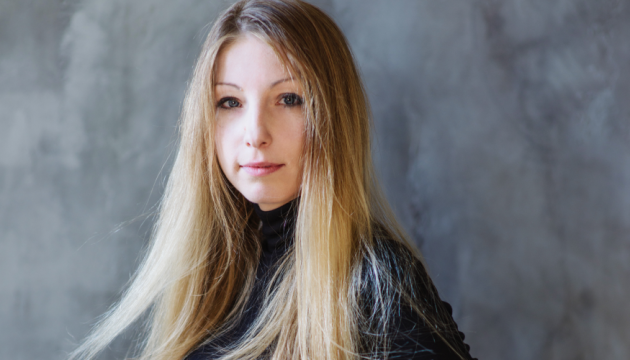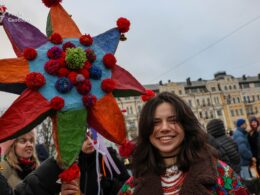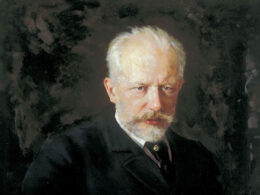"I wish I had never been on this stage. I wish I had never made this film," said Ukrainian director Mstyslav Chernov last year, accepting Ukraine’s first-ever Oscar for his documentary on Russia’s assault on Mariupol.
What Chernov didn't say: his Oscar-winning 20 Days in Mariupol exists only because its team survived the brutal siege they documented. Since February 2022, Russia has systematically targeted Ukrainian cultural voices — through assassinations, bombings, and combat — leaving more than 100 cultural figures dead in its wake.
This week, 31-year-old artist Marharyta Polovinko became the latest casualty. The 31-year-old died in combat after transitioning from volunteer medic to soldier in eastern Ukraine. Her death means every painting she would have created vanishes — not destroyed, but prevented from ever existing.
The five creators profiled here represent just a fraction of the cultural destruction unfolding in Ukraine. Their stories offer a window into a broader catastrophe — how Russia’s war is methodically extinguishing creative potential, turning once-promising talents into voids before their greatest works can be created.
The conductor who refused to perform for his killers
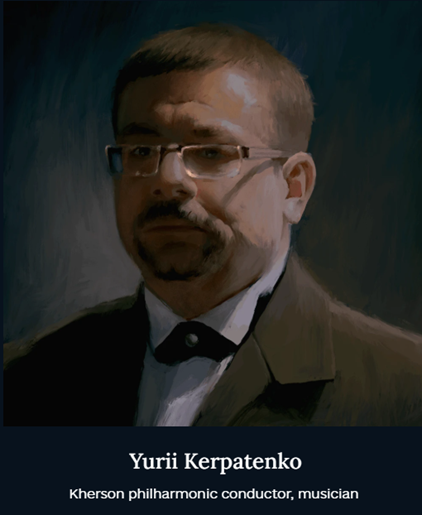
"There is no need to save me by threatening me... There is no need to bring the 'Russian world' to Kherson," wrote musician Yurii Kerpatenko on his Facebook page in spring 2021.
Exactly a year later, when Kherson was already under Russian occupation, he reposted this message despite now it posed the deadly danger it posed to his life.
Nurtured in an environment heavily influenced by Russification at the Kyiv Conservatory — Ukraine’s leading music institution — Kerpatenko frequently championed Ukrainian composers as foundational to the nation’s musical heritage. He resisted the colonial influence of Russian music by creating high-quality arrangements of Ukrainian folk songs.
Kerpatenko’s convictions never wavered, even later in life when he became the conductor of the Kherson Philharmonic. He understood what many of his colleagues did not—that performing for the occupiers wasn’t just a concert but a declaration of legitimacy.
During the city's occupation, when Russian forces demanded he conduct a staged concert on Music Day, he refused.
"I will not collaborate with the Russians!" he declared, despite colleagues trying to convince him to comply for his own safety.
A few months later, on 27 September 2022, Russian soldiers shot Yuriy Kerpatenko through the door of his own apartment. His wife, who was with him at that moment, sustained severe injuries. Hearing the approaching occupiers, the couple embraced and exchanged words of love for the last time.
The colleagues remembered Kerpatenko as principled and demanding of himself, who taught all Ukrainians a lesson in responsibility — for Kherson, for their beliefs, and for their culture.
"Not in vain did the samurai say: live as if you are already dead," Yurii Kerpatenko wrote.
The writer killed in search of buried truth
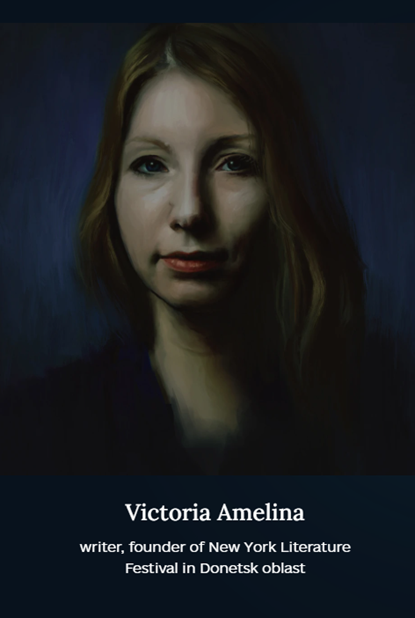
“This would be, perhaps, the scariest moment for me during this war,” confessed writer Victoria Amelina, describing the fear of losing a manuscript. “This would be, you know, like a second death for a writer — trying to pass your message to the world and failing at it.”
Throughout the full-scale invasion, Amelina was deeply engaged in humanitarian efforts — delivering books to war-damaged libraries in frontline and deoccupied areas, their windows covered with plywood, and documenting both the war itself and the erasure of Ukraine’s cultural voices.
“I was in the middle of a new Executed Renaissance," she wrote, comparing Russia’s murder of cultural activists to the Stalinist purges. "Just like in the 1930s, when Ukrainian artists were being murdered, their manuscripts disappearing, and their memory wiped away.”
Just two weeks after Kharkiv Oblast was liberated in October 2022, Amelina unearthed the occupation diary of Ukrainian writer Volodymyr Vakulenko.
In late March 2022, just days before being taken by Russian forces occupying his village of Kapytolivka, Vakulenko buried the diary under a cherry tree in his garden. Six months later, his body — bearing two bullet wounds — was found in a mass grave left behind by retreating Russian troops.
In June 2023, Vakulenko’s diary was published with Amelina’s foreword. She wrote that recovering the diary had given her a small sense of relief:
“Volodymyr’s message was saved — even if the next day I had to step on an anti-infantry mine. As long as a writer is read, they are alive.”
Just days after the book’s successful presentation in Kyiv, this ominous prophecy became reality.
On 27 June 2023, Amelina was fatally wounded in a Russian missile strike on Kramatorsk, a bustling hub for Ukrainian and international media, volunteers, and aid workers, just thirty kilometers from the eastern front line.
Around dinnertime, Russians launched a precision Iskander missile strike on a popular pizza restaurant. Amelina was inside with a delegation of Colombian writers she had accompanied to Donetsk Oblast to raise awareness of the war.
The attack injured sixty people and killed twelve, including three children. Five days later, Amelina succumbed to her injuries — becoming part of the new “Executed Renaissance” she had fought to preserve Ukraine from.
The actor who performed his own end

“If it was happiness, it was so strong that the whole room shook, and every person in it felt how happy Anton was,” actress Olha Dunebabina says about her colleague.
In the autumn of 2016, 17-year-old translation student Anton Prasolenko discovered an amateur theater called Babylon in Kyiv. Having come to support his friend, he watched the auditions and got fascinated by the idea of taking up acting himself.
By the outbreak of the full-scale Russian invasion in February 2022, Anton Prasolenko, now a twenty-two-year-old actor at the Babylon Theater and barista in Kyiv, had enlisted in the Territorial Defence Forces.
In March 2023, already a fighter of the 241st Brigade of the Ukrainian Armed Forces, he sustained serious injuries in battle near Bakhmut and died a week after doctors’ attempts to save him.
"Anton would have been lying to himself if he hadn't gone through with it," said Tetiana Reva, Anton's fiancée and a fellow actress at the Babylon Theater.
Anton Prasolenko and Tetiana Reva got engaged in the spring of 2022. They seized every opportunity to be together, both before the full-scale invasion, during their three and a half years living together in Kyiv, and afterward, when Anton became an aerial reconnaissance officer and Tetiana a paramedic.
A year later, Tetiana was the one suggesting designing his grave.
In his final role as an actor, Anton played the main role of Messiah, who carries a cross. The same cross now stands on the young man's grave at Berkovetsky Cemetery in Kyiv — the idea suggested by his fiancee.
“Now they are planning to build a memorial complex on the alley where the soldiers are buried,” says his father Oleh. “We would like to leave the wooden cross from the theater near our son's grave – it is very important for our family."
One time, Tetiana and Anton's units ended up close to each other in eastern Ukraine. Prasolenko managed to come over for a date.
“We spent a day and a half together,” Tetiana recalls. “It seemed like so little time, but now I remember our 10-minute meetings in the intensive care unit of a Kyiv military hospital and think, 'A day and a half... thank you.'"
The photographer who died defending the history she documented
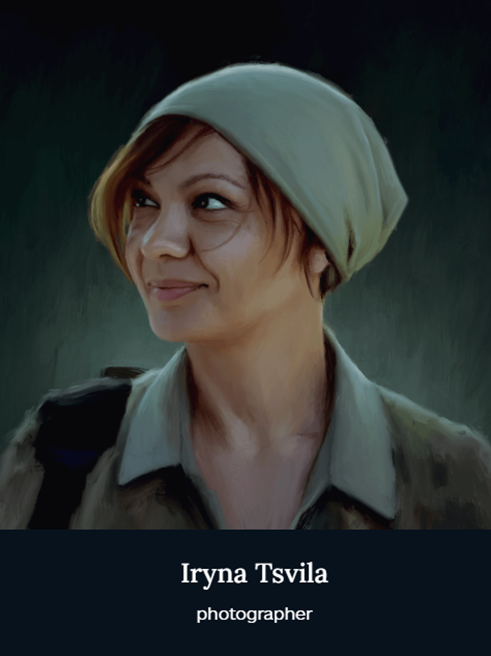
"I want to be useful," photographer Iryna Tsvila always said.
Iryna Tsvila, known by her callsign “Linza” (Lens), believed it was important to care for everyone: abandoned animals, her brothers-in-arms, and millions of Ukrainians she went to defend on the front lines.
Irina’s war began on Maidan during the fateful winter of 2014. Throughout those months, Tsvila stood at the heart of the Revolution of Dignity, camera in hand, capturing history as it unfolded — and the people who made it happen. For some, her photos would be their last.
Then the war began. At that time, women in the Armed Forces were a rare phenomenon, but Iryna stepped up without hesitation and joined the Sich volunteer battalion. A teacher by profession, she had never handled a weapon before, so she had to learn everything from scratch.
Linza liked to repeat that war strips everything away and reveals who you truly are. She, in turn, was the kind of person who, despite fear and freezing temperatures, would head to her position to stand watch. After her shift, Iryna usually cooked dinner for her fellow soldiers so they'd have something hot to eat after returning from the cold trenches.
Though she was used to comfort and order, she quickly learned to live in basements and sleep as plaster from explosions fell onto her face. She even made peace with the front-line mice and photographed her comrades.
Returning from the front wasn't easy for Iryna. She was hurt by the indifference of those who chose to ignore the war and by those who “didn't understand” why people were fighting in Donbas and heavily burdened by the loss of her fallen comrades.
On the first day of the invasion, Iryna and her partner rejoined the army and rushed to fend off the Russian advance on Kyiv. They both died together the very next day. Today, Iryna's legacy lives on through her daughter, Daria, who continues her work.
When art is no longer enough
“What's happening around us is not meant for artists,” said sculptor Anton Derbilov, who consciously set aside everything he had been doing before the great war.
From a young age, Anton was drawn to the world of miniature sculpture. Born in Zaporizhzhia, he loved wandering around Khortytsia Island, a fateful place for Ukrainian history, where his imagination was filled with stories about the Cossacks.
Like all children, Anton role-played military campaigns and battles with toy soldiers. But Anton's case was exceptional: he was captivated by the smallest details of the figures, and eventually, he began creating his own.
Anton made his first attempts at sculpting in his father's workshop, making it his life calling besides a variety of artistic activities he was passionate about, such as graphic design and drawing, flamenco, singing, playing guitar, and baritone ukulele.
“Miniature sculpture is the only thing I do professionally. Everything else is just a hobby,” the craftsman said.
In the spring of 2014, when the Russian army invaded the Donetsk and Luhansk regions in Ukraine’s east, Anton wanted to pack a backpack and join the army. However, his duty as a father of three young daughters outweighed his desire to join the fight.
Throughout the eight years of the war, Anton couldn't shake the feeling that he had “wasted his time” despite actively volunteering to aid the military with supplies. He only found solace in 2022, during the Russian attacks on Kharkiv, when his long-living call to join the Ukrainian army finally became a reality.
That year, the scorching summer ended with a large-scale counteroffensive conducted by Ukrainian forces, in which Anton’s unit participated. After a tough winter, the Derbilovs hoped to regain some semblance of normalcy. Anton was scheduled to be transferred to Kharkiv in the spring.
“We were waiting for him to return. But not under such circumstances,” recalls his wife, Kateryna Derbilova.
Their friendship, and later love, which started when they were just 15, ended years later on her birthday when he died in combat.
Now, each week, Kateryna visits the Alley of Heroes in Kharkiv, where hundreds of Ukrainian flags sway in the wind. She sits on a tourist mat in front of Anton's grave, finding solace “among her own.”
“So that I wouldn't be alone on that day,” she says.

